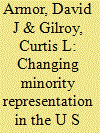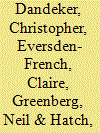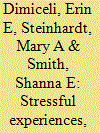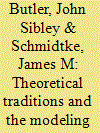|
|
|
Sort Order |
|
|
|
Items / Page
|
|
|
|
|
|
|
| Srl | Item |
| 1 |
ID:
094136


|
|
|
|
|
| Publication |
2010.
|
| Summary/Abstract |
The Department of Defense has always sought a socially representative enlisted force, especially with respect to African American and Hispanic minorities. Ideally, in a democratic society a military force should be representative of the nation it defends. African American overrepresentation was a major concern during the first decade of the All-Volunteer Force (AVF), while Hispanics were underrepresented. During the 1980s black representation stabilized and Hispanics began to increase, especially with respect to enlistments. Starting in the 1990s, black representation began to decline, followed more recently by declines among Hispanics. This article examines changes in minority representation since the inception of the AVF in 1973 and argues that the wars in Afghanistan and Iraq have played a significant role in recent changes.
|
|
|
|
|
|
|
|
|
|
|
|
|
|
|
|
| 2 |
ID:
094138


|
|
|
|
|
| Publication |
2010.
|
| Summary/Abstract |
U.K. Reserve Forces, principally the Territorial Army (TA), have been increasingly used since the end of the cold war, but there have been some concerns about their mental health problems and also possible unwillingness to remain in service. This article reports on the retention issues of 191 TA personnel who deployed to Iraq from 2003 to 2006. Qualitative data were thematically analyzed from three complementary studies. The authors found that, in 2003, negative aspects of Army organizational culture were reported as the prime reasons for TA personnel wishing to leave the military. In particular, Reservists reported their being unaccepted and underutilized. In contrast, by 2006, TA personnel were generally reporting being satisfied with their work as a Reservist and felt integrated with Regular colleagues. Those who stated they wanted to leave the military now reported it was primarily because of poor military family welfare support. These results suggest that although the British Army appears to have successfully managed the changing role and integration of the TA on operations, family welfare needs further consideration as an important influence on retention. Since the end of data collection for this study, new measures focusing on welfare have been introduced. Future work will assess the impact of these changes.
|
|
|
|
|
|
|
|
|
|
|
|
|
|
|
|
| 3 |
ID:
094140


|
|
|
|
|
| Publication |
2010.
|
| Summary/Abstract |
This article addresses the causes and dynamics of spin-off violence by paramilitary groups that developed in Serbia in the early 1990s. It shows that some forms of violence that challenge the state's monopoly come into being due to decisions of state agencies. But delegated violence easily develops a life of its own, and therefore the decisions of state leaders are not the only variable, perhaps not even an important one, needed to explain the dynamics of violence once the turmoil of war has started. In retrospect, it seems as if warfare was just an episode in the political life of militias or the political groupings behind them. Violence was just one means among others in the fight for political chances. Therefore, the emergence and the life of these groups have to be explained as attempts of single political entrepreneurs to achieve the accumulation of power through the exertion of violence
|
|
|
|
|
|
|
|
|
|
|
|
|
|
|
|
| 4 |
ID:
094137


|
|
|
|
|
| Publication |
2010.
|
| Summary/Abstract |
This article forwards a novel approach regarding the U.S. military's growing focus on building cross-cultural competence. This piece argues that a link exists between the armed forces' internal cultural diversity issues and the military's objective to heighten its ability to work effectively in foreign cultures. Cross-cultural competence means the knowledge, attitudes, and behavioral repertoire and skill sets that military members require to accomplish all given tasks and missions involving cultural diversity. Despite the military's noteworthy historic progress in the area of building a diverse and cohesive force, it possesses some ongoing cultural diversity problems. The article examines three concerns within the ranks of the U.S. military: signs of religious intolerance, some ongoing resistance toward women service members, and antihomosexual attitudes and conduct. This piece explores these concerns and also argues that ameliorating these cultural diversity issues will contribute to building cross-cultural competence in the military.
|
|
|
|
|
|
|
|
|
|
|
|
|
|
|
|
| 5 |
ID:
094141


|
|
|
|
|
| Publication |
2010.
|
| Summary/Abstract |
The military and police professions share a number of common facets, but in spite of surface similarities, the two professions are significantly different. Consequently, the evidence indicating a convergence of primary aspects of the two roles presages an important societal development, with substantial implications on several levels. Thus, this article has several objectives. First, it reviews the evidence indicating role convergence, that is, evidence that significant segments of police operations in the United States have taken on military characteristics; and evidence indicating that many U.S. military initiatives have taken on policing characteristics. Next, using the notion of internal and external role-change "drivers," it examines how such role shifts occur and considers some political and legal implications of the shift. Third, the article compares the role orientations and job demands of both professions, identifying the important differences inherent in the two roles and presenting an analysis of the occupational implications of role convergence for job holders, job evaluators, and job "clients" (i.e., ordinary citizens). The last section considers the implications of role convergence for role management.
|
|
|
|
|
|
|
|
|
|
|
|
|
|
|
|
| 6 |
ID:
094142


|
|
|
|
|
| Publication |
2010.
|
| Summary/Abstract |
A survey of military wives (N = 77) identifies their most stressful experiences, self-appraised control over these stressors, and coping strategies used. The authors examine two competing hypotheses: the goodness-of-fit hypothesis that the effects of problem-focused coping (PFC) and emotion-focused coping (EFC) strategies on distress are moderated by the appraised controllability of the stressor, and the main-effects hypothesis that PFC strategies are more effective than EFC strategies in reducing distress regardless of appraisal of controllability. Wives identified deployment of soldiers as their most stressful experience, and reported using PFC strategies more frequently than EFC strategies. EFC strategies were predictive of greater physical symptoms of illness, while PFC strategies were related to reduced physical symptoms of illness only when military wives' perceived control of the situation was low. PFC strategies and controllability were significantly related to decreased depressive symptoms; EFC was marginally related to increased depressive symptoms, lending greater support to the main-effects hypothesis.
|
|
|
|
|
|
|
|
|
|
|
|
|
|
|
|
| 7 |
ID:
094135


|
|
|
| 8 |
ID:
094139


|
|
|
|
|
| Publication |
2010.
|
| Summary/Abstract |
Mandates for UN peacekeeping operations in Africa have become more robust since the delivery of the Brahimi Report in 2000. Contrary to before, soldiers are now unmistakably expected to use force to protect local civilians in a number of UN peacekeeping missions in Africa. While this expectation of force may be celebrated, the question rises whether peacekeeping soldiers can meet the expectation. Are they ready to kill and risk their lives to protect local civilians? This question is especially pertinent to Western armed forces, which have contributed little to post-millennium UN peace operations in Africa but are explicitly called upon by the UN administration to contribute to the robust peacekeeping missions. This article discusses the question of moral and psychological preparedness in light of the possible tension between the nationalist orientation in Western armed forces and the cosmopolitan demands of UN peacekeeping operations in Africa.
|
|
|
|
|
|
|
|
|
|
|
|
|
|
|
|
|
|
|
|
|